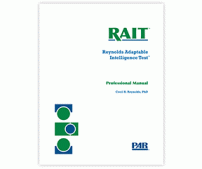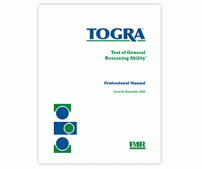PAR is pleased to announce the release of two new tests of intelligence and reasoning ability by Cecil R. Reynolds, PhD — the Reynolds Adaptable Intelligence Test™ (RAIT™) and the Test of General Reasoning Ability™ (TOGRA™).
The RAIT is a rapid, reliable, and valid intelligence test designed for group or individual administration.
- Composed of seven subtests that assess crystallized intelligence, fluid intelligence, and quantitative aptitude or intelligence.
- Designed to provide continuity of measurement across a wide age span.
- Can be used to help users determine a child’s educational placement and diagnose various forms of childhood psychopathology; as a measure of intelligence in general clinical and neuropsychological evaluations; as part of evaluations for the diagnosis of specific disorders; in disability determinations under various state and federal programs; and as a measure of aptitude in human resources/employment settings.
Composed of items from the RAIT, the TOGRA is a speeded measure of reasoning ability and problem-solving skills.
- Offers a wider variety of item content and greater test score stability than competing measures.
- Requires only 16 minutes for administration and 2-3 minutes for scoring.
- Appropriate in many settings whenever a speeded measure of reasoning ability and problem solving under pressure is considered useful, including in the evaluation of students for giftedness, athletes, managerial and executive-level staff, and public safety officer candidates.
- Two equivalent alternate forms (Blue and Green) enable users to retest and monitor progress without concern for practice effects.
Filed under: New Products, Products, Research | Tagged: assessment, Cecil R. Reynolds, Cecil Reynolds, intelligence, RAIT, reasoning ability, TOGRA | Leave a comment »



 —meetings may, in fact, make us dumber.
—meetings may, in fact, make us dumber.